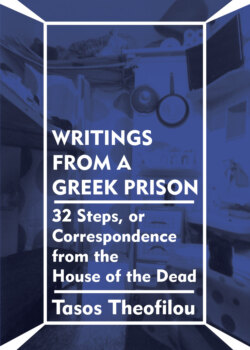Читать книгу Writings from a Greek Prison - Tasos Theofilou - Страница 8
На сайте Литреса книга снята с продажи.
Editors’ Note
ОглавлениеAnarchist-communist Tasos Theofilou was arrested by the Greek Anti-Terrorist Unit on August 19, 2012. At the Court of First Instance (November 11, 2013–February 2, 2014), Theofilou was sentenced to twenty-five years of imprisonment for the charges of common complicity to homicide and the armed robbery of an Alpha Bank branch in Paros on August 10, 2012. He was acquitted of direct perpetration of homicide, joint constitution of and participation in the Conspiracy Cells of Fire (CCoF), and possession of explosives and “war material.” At the Court of Appeal (November 21, 2016–July 7, 2017), Theofilou was acquitted of all charges. In 2018, Theofilou faced the danger of going back to prison due to an appeal lodged before the Supreme Civil and Penal Court of Greece [Areios Pagos] by one of its deputy prosecutors against the decision of his acquittal. The court rejected the appeal, and Theofilou was, definitively and irrevocably, acquitted of all charges. Theofilou spent five years in the prisons of Domokos and Korydallos. He was a member of the Network of Imprisoned Fighters and took part in a hunger strike (March 2, 2015–April 10, 2015) with a series of demands against the most recent punitive turn of the Greek penal system.1 A wide solidarity movement supported Theofilou all these years.
The political case of Theofilou coincides with the implementation of the Economic Adjustment Programs (EAPs)—aka “the memoranda”—between the Greek state, the Euro-area member states, and the International Monetary Fund (IMF).2 We can discern two distinct periods in how the EAPs are framed and moralized.
In the first period (2010–2015), which encompasses two EAPs, the Greek political personnel3 framed the Greek crisis as one of competitiveness and sovereign debt, by linking it on the one hand to clientelism and rent-seeking and on the other hand to the Eurozone crisis and the global financial crisis. They moralized the crisis by coercing the population to internalize guilt and responsibility for it, while turning the parts of the population who did not fit or comply into a public enemy. Privatization and direct and indirect social wage cuts ran parallel to the racialized and gendered criminalization of HIV-positive persons, intensified policing of the Roma population and migrants, and the brutal repression of anti-memorandum opposition.
In the second period (2015–2018), the Greek political personnel4 framed the Greek crisis as a humanitarian crisis, not by negating the framing of the first period but by linking it to the impact from the internal devaluation policy of the first two EAPs and the European migrant crisis. They moralized the Greek crisis by recuperating the anti-memorandum opposition, through the part of the population complacent enough to share responsibility for a national reconstruction plan and vote for and/or cooperate with the lesser of two evils. Structural adjustment, expansion of the population under workfare and/or NGOs/philanthropy, and over-taxation paralleled the promotion of a “social and solidarity economy.”
We publish Writings from a Greek Prison by Theofilou to contribute to an understanding of social cannibalism from the perspective of prisonization—the extension of prisons and the lives they consume. We also want to draw attention to writings from the years of the memoranda that do not zero in on the social roles directly targeted by the EAPs, namely homeowners, self-employed or salaried workers, and welfare recipients. In this sense, the text by Theofilou is timely and rare. It provides an alternative angle on the years of the memoranda from the perspective of the “surplus population” in prison. The social relationships among inmates brings front and center a view of counterrevolution from below, while retaining in the background counterrevolution from above through the centrality of criminalization, penalization, and incarceration to contemporary capitalism.
What you hold in your hands is an English translation of the text “32 Steps, or Correspondence from the House of the Dead,” in which Theofilou blends social commentary with three short stories, free verse, and a prison dictionary. Additionally, we include two letters written by Theofilou that contextualize his trial.
DIPLI editors
December 2018
Athens, Greece
1. Abolition of Articles 187 (“Criminal Organizations”) and 187A (“Terrorist Acts”) of Chapter 6 (“Threats to Public Order”) of the Penal Code; abolition of Articles 25 and 27 of Law 3772/2009 [which criminalized the use of any device that covers, hides or conceals a person’s face]; abolition of “Type C” maximum security prisons; restricting the implementation of Article 200A (“DNA Analysis”) of the Code of Judicial Procedure and its interpretation by the Public Prosecution Office of the Supreme Civil and Penal Court of Greece in Advice 15/2011 [in relation to forced extraction of DNA, use of mixed DNA samples, and presence of an expert witness on behalf of defendants in DNA analysis]; release of November 17 member and polytrauma patient, Savvas Xiros, in order to receive proper medical care.
2. First EAP (2010–2012); second EAP (2012–2015); third EAP (2015–2018).
3. Cabinet of George Papandreou (junior), Panhellenic Socialist Movement (October 7, 2009–November 11, 2011); coalition cabinet of Lucas Papademos, Panhellenic Socialist Movement – New Democracy – Popular Orthodox Rally (November 11, 2011 to May 17, 2012); cabinet of Antonis Samaras, New Democracy – Panhellenic Socialist Movement – Democratic Left (until June 25, 2013); Agreement for the New Greece (June 21, 2012– January 26, 2015).
4. First cabinet of Alexis Tsipras, SYRIZA – Independent Greeks – Ecologist Greens (January 27, 2015–August 28, 2015); second cabinet of Alexis Tsipras, SYRIZA – Independent Greeks (from September 23, 2015).
